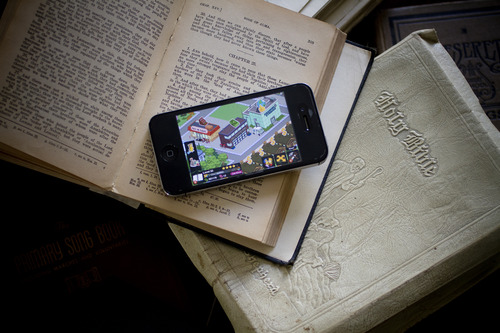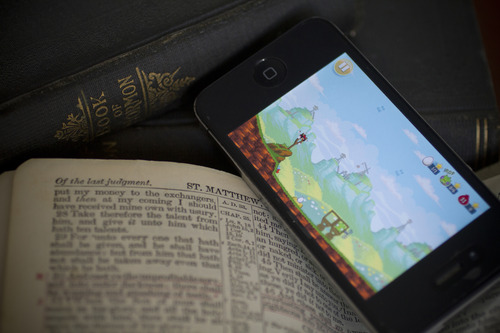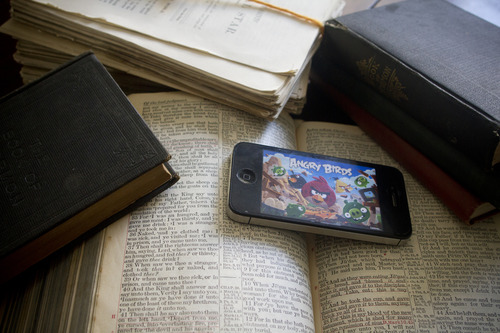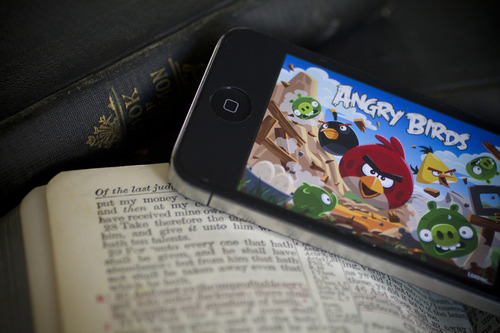This is an archived article that was published on sltrib.com in 2013, and information in the article may be outdated. It is provided only for personal research purposes and may not be reprinted.
Tyler Woolstenhulme might be loath to admit it but sometimes he's not paying attention in church. He will happily confess that he's not the only one.
The 31-year-old Mormon has more than once sat in the pew of his Sandy ward and let his mind wander. When that happens, he pulls out his iPhone 4 and sometimes plays his puzzle game, "1to50." Or maybe he texts his friends across the aisle.
"I take the time in church to catch up with people I haven't contacted in a while," he said. "I text friends or family."
The thing is, he says, about half the congregation also is on phones and tablets during a sermon.
"I see people play games all the time. I've seen them watch football games," he said about other congregants and their mobile devices. "I've also seen people make up bingo games where they cross off things that the bishop may say — like 'Testimony Bingo.' "
For many bored churchgoers, fiddling with smartphones or computer tablets is the 21st-century equivalent of playing tic-tac-toe or dozing off during services.
It can be a problem particularly with younger members, the first generation to know no life without cellphones or social networks and with whom digital devices are "like an appendage to their body," said Colleen Gudreau, spokeswoman for the Catholic Diocese of Salt Lake City. "They don't see it in the same context as the adults do."
Firing up the iPhone or iPad can be especially tempting for Mormons in search of a break, according to some members, possibly due in part to Sunday services that stretch over three hours.
The Salt Lake City-based Church of Jesus Christ of Latter-day Saints has no official policy banning the use of mobile devices during services, according to spokeswoman Ruth Todd.
In fact, LDS mobile apps containing scriptures, lessons, conference sermons and more can heighten rather than hinder the worship experience.
The devices also can be a godsend for parents wrestling with fidgety children. It's not uncommon to see adults handing their phones or tablets to youngsters to play games to occupy their minds and quiet them.
But sometimes, many can be seen accessing Facebook, checking sports scores, catching up on the news or playing a quick game.
Almost every church has offenders. One churchgoer was so focused playing the puzzle game "Candy Crush" on his phone he didn't notice that sacrament meeting (the main LDS worship service) was over and everyone had left. Another Mormon was playing his racing game on a tablet while grasping and turning the iPad like a steering wheel.
When Kurt Anderson, a bishop in the Sandy 13th LDS Ward, was in a singles ward, he noticed 60 percent to 80 percent of the churchgoers were on their phones and tablets during a service. Now that he heads his own congregation of older members, he still sees about 10 percent of them on their mobile devices during sacrament meetings.
"It's nothing too terrible," Anderson said, "but there are some moments where you try to corral them in, where you say, 'Let's put the electronic devices down and try to connect as individuals.' "
In some cases, devices have become so distracting so often that it's normal to remind parishioners before worship services to turn off their mobile units. Some LDS bishops have mentioned it in their talks. Other churches post signs or remind congregants in their weekly bulletins. At the Butler 18th LDS Ward in Cottonwood Heights, teen girls in the Young Women group began putting their cellphones in a basket before the start of class when texting got out of control. The Westminster Presbyterian Church in Burbank, Calif., even produced a wildly popular YouTube video with more than 3.8 million views that quips if your phone rings during the sermon, "You're going straight to hell."
"Remember," the narrator stresses, "God wants your complete attention."
"A lot of churches have announcements at the beginning that this is a holy time and to please put their devices away. It's like in an airplane," said Samantha Almanza, director of the youth and young-adult ministry for the Catholic Diocese of Salt Lake City. "It's just time to dedicate to God and not your mobile device, and that's taught to them and reinforced to them."
Many Salt Lake County clerics insist it's not a huge problem during their services, mostly because the reverent tone in church is set when parishioners walk in, and they know not to disrupt the moment.
"It just comes out of the tradition, out of the reverence and the reason for being in church," said the Rev. Michael J. Imperiale, senior pastor at Salt Lake City's First Presbyterian Church. "There are some churches where it is a command or duty to be at church. For most Protestant churches, people who are here are here because they want to be. People are not forced to be here."
Now that electronic devices have become so ubiquitous in churches, some clergy want to use them to their advantage.
"I'm actually exploring a service where I would encourage people to Twitter me," said the Rev. Dennis Shaw, pastor at Sandy's Hilltop United Methodist Church. "So as I'm doing the service and I have my cellphone in my hand and the Twitter [feed] changes, I can follow the dialogue. It's a way of potentially engaging people."
The Rev. Ray Waldon, dean of Salt Lake City's Episcopal Cathedral Church of St. Mark, recently attended a seminar in San Diego titled "Digital Jesus" in which church leaders were encouraged to get their members tweeting and posting about the sermons during service. He said the younger people using social media were referred to as "digital natives" while older churchgoers are known as "digital immigrants."
"Our digital natives are truly paying attention. What they are doing is texting or tweeting the word of God," he said. "My experience at this cathedral is not that they are not paying attention. It's quite the opposite — they are so moved they want the word of God to get out."
Waldon said that's why he posts the phrase "If it's sweet, tweet" in the weekly church bulletin.
The LDS Church also has embraced the digital age, producing a dozen official mobile apps for phones and tablets that allow members to search scriptures or prepare Sunday School lessons. Leaders are even urging full-time Mormon missionaries to spend less time knocking on doors and more time clicking on social-media sites to find potential converts.
"I see development of technology as the fulfillment of a Judeo-Christian prophecy," said Tracy Cowdell, president of the Sandy West LDS Stake. "Isaiah, who spoke of our time, said: 'The Earth shall be full of the knowledge of the Lord, as the waters cover the sea.' Technology is a way for us to connect with more people and more people having more access to spiritual information."
But with that technological adoption comes its inevitable misuse, something Bishop Anderson is all too aware of in his LDS ward.
"Like everything, you have to take the good with the bad," he said. "I don't know exactly what everybody is doing with their phones, but you hope for the best and hope things aren't as bad as you think."
So it's "Real Racing" vs. real religion.
Google+: +Vincent Horiuchi











